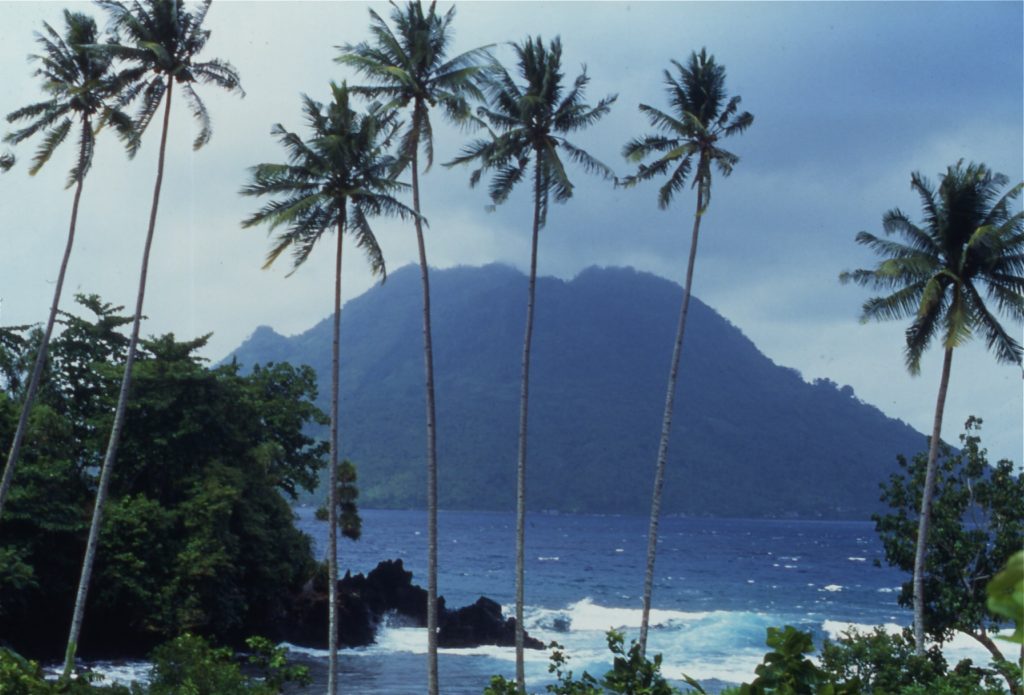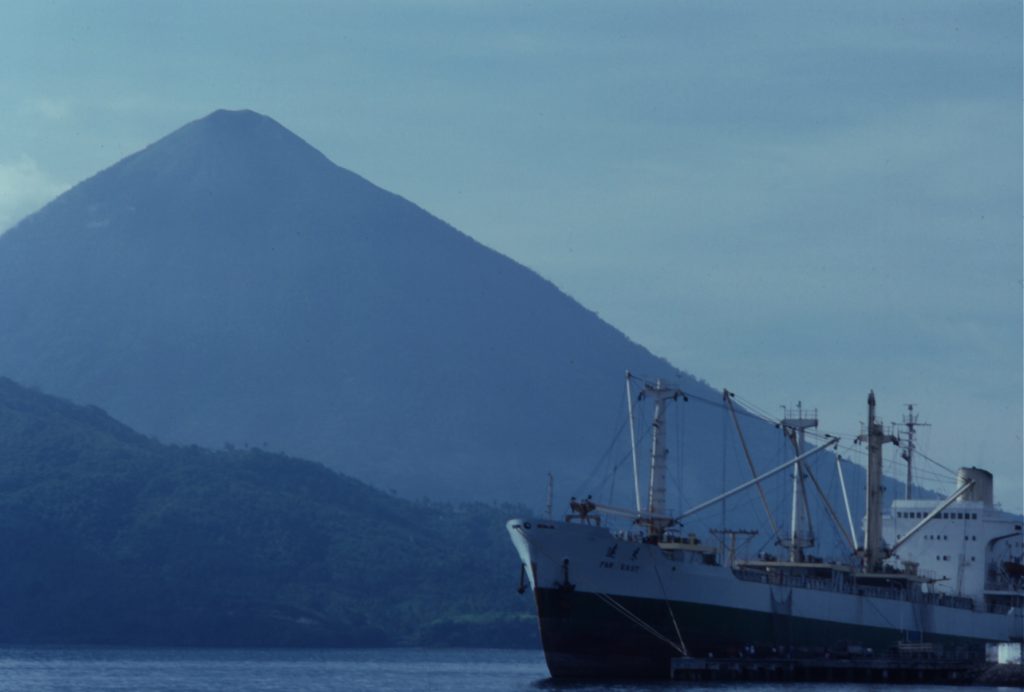The following excerpt is taken from: “Sword Dancer”, a novella by Simon Rowe (see www.mightytales.net).
***********
ONE
From somewhere along the hallway of the Ternate Port Authority came the clack-clack sound of an old-fashioned ribbon typewriter being punched one finger at a time. A toilet flushed and a phone rang constantly in a far-off office. It was the symphony of a small island bureaucracy hard at work.
A woman in high-heels turned out of a door marked “Maritime Affairs” and walked down the wooden hallway towards the office of the Harbor Master General. She was tall for a Malukan, wore a tight beige skirt and a shirt with epaulettes. She walked with a rhythm that could break the concentration of even the most dedicated male civil servant.

As she passed by the office, she glanced through the open door and her eyes met with mine. A smile might have crossed her lips before her footsteps faded into the zip-ring of the typewriter being pushed home.
‘Mistah Cocaine. Mistah Cocaine! Can you hear me?’ The Harbor Master’s words rolled about the room like distant thunder. He lumbered to the door and shut it.
‘It’s Caw-caigne,’ I said. ‘Can you leave it open?’
The big man looked at me questioningly. He pulled on the door and kicked back the wedge.
Three days of rest, rice gruel and jackfruit juice courtesy of the Ternate Public Hospital, and I was still having trouble concentrating. My eyes wept, my skin burned and every fibre beneath it felt like it had been reversed over by a small truck. Even the ceiling fan breeze hurt.
‘I asked if you require any assistance from the Consul-General?’ the Harbor Master said again. ‘We will contact them in Jakarta on your behalf if you wish.’ He returned to the small pale green desk and squeezed his large buttocks into the chair. A black dial telephone sat in one corner, a clam shell filled with half-smoked clove cigarettes in the other and between them an opened Manila file. A single sheet of paper fluttered on top of it.
A nautical map of the Maluku Islands of Indonesia covered the wall behind the desk. It may as well have been the wallpaper for the size and the hundreds of blue lines which swirled in endless whirlpools, each one numbered, each denoting an island’s gradient, a reef’s depth, a shipping channel’s width.
Morotai island loomed from them like a ragged wound. I followed the route the night ferry had taken from Daruba to Halmahera Island. 130 kilometres south, noting the name “Nusa Kohatola” printed on its western coastline. Yesterday’s newspaper had reported that a fishing station nearby picked up a vessel-in-distress signal on the night of the storm. Ternate had been alerted and navy rescue boats dispatched. Just before dawn two women – one of them pregnant – had been pulled from the rough seas. A cage full of dead fighting cocks and some rubber sandals were all else that had been recovered.
Not a day had passed when I hadn’t asked the hospital staff about the fate of the other passengers: the Catholic priest returning to Ambon for his daughter’s wedding? The teenager escorting his uncle to Jakarta for a cataract operation? The quiet young Muslim couple and their baby. Most of all I’d wondered about Kazuha, the Japanese man, whose bag now lay at my feet.
If I had drifted twenty-five kilometres through a sea littered with islands and atolls, then surely he could have done the same. But three days had passed since the Umsini had capsized en route from Daruba to Ambon. The official search had been called off and I now sat waiting for the Harbor Master to close the file on the third known survivor.
‘Mistah Cockaigne, what is your answer please!’
‘My passport,’ I said. ‘Can I have it back.’
From a side drawer he lifted out a booklet marked with a faded kangaroo and emu coat-of-arms and pushed it across the desk.
I thumbed to the first page and a photo of the man with tousled brown hair, seaweed-green eyes and a scar on his upper lip stared back. To the Australian Government his name was Noah James Cockaigne, born in Sydney, December 24, 1977. To his father he was a lost cause; to his ex-fiancee, a troublemaker and a fool; and to the Sydney Harbour Police he was now a ‘person of interest’.

The Harbor Master pulled a packet of kreteks from his chest pocket and gestured with his eyebrows. I took one and he lit it before lighting his own.
‘The doctor advises you rest in Ternate a week longer. We have reserved a room for you at a guesthouse in town. You should be quite comfortable there.’
He leaned back, relieving his waistline and let the ceiling fan carry off the fragrant blue smoke.
‘There is also the matter of compensation. The ferry owners in Surabaya are co-operating with us. However, it seems that they have been insolvent for some time. You understand it may be some time before you receive anything.’
He drew deeply on his kretek, letting the saltpetre crackle, watching me. He followed my gaze to the open door, then stubbed out his kretek. He shrugged his bottom free of the chair and rose to his feet.
‘We are very sorry for your ordeal. It has been a very unfortunate experience for all of us. Now, please excuse me but I must attend a meeting in a few minutes. There is a driver waiting downstairs to take you to your guesthouse. I will have one of my staff call on you tomorrow evening.’
He handed me his name card. ‘In the meantime, if you require anything during the rest of your stay on Ternate please do not hesitate to contact me. Salamat jalan.’
He shook my hand and left the office. The sound of a woman’s heels joined him at the end of the hallway and then they were gone.
***
The teenaged driver drove with a knack and he was thrifty. He rode the clutch barefoot down the slope to the shore, tapping the horn melodiously to clear a space amidst the morning traffic which raced along the esplanade and into Ternate town.
Tented warungs and bakso carts lined the seawall and their fish ball soup and mie goreng aromas washed through the car, reminding me that I hadn’t eaten since my leaving the hospital.
The town clutched the base of the volcano, colourful clapboard buildings with iron roofs of all shapes and sizes. A church tower rose here, a mosque’s minaret there; seafood restaurants pushed out over the water on stilts and the slopes of the volcano carried anyone who couldn’t live downtown upwards. Spice farmers had crept their holdings fearlessly to the crater; each plot a small bet against the sleeping giant whose thin ribbon of grey smoke drifted lazily seaward. Ternate island was Mount Gamalama and Mount Gamalama was Ternate island.
We entered town and the driver pummeled his horn to musical effect. Market goers and their mysterious bundles parted before us, flowing around the car in two colourful streams. A wild-eyed man peered in through my window, a cigarette smoldering between his betel-red lips, a whole tuna fish perched on his head.
‘Everyday market day,’ said the driver, jerking his head at a line of old women squatting behind their wares beneath the Tamarind trees.
‘Want kayu manis?’ he said.
‘What?’
‘Cinnamon.’
‘No.’
‘Chillies?—you like chillies?’ He swivelled in his seat, beat his lips with fingers. ‘Pedas! pedas! Hot! hot!’
‘They give me a ring of fire.’
The teenager grinned enthusiastically.
‘You want marijuana?’
‘Ask me tomorrow.’
He turned off the main street and onto a narrow road which climbed steeply through a neighborhood of simple tin and wood homes where cinnamon, nutmeg and clove trees sprouted in neat rows and fruit trees clustered in lush groves.
‘You see volcano today?’ asked the driver.
‘I can see it now.’ I said, peering between the torn vinyl seats at the smoking caldera up ahead.
‘Okay, tomorrow, you see with me, my car?’
‘No.’
‘You want girl?’
‘No. I want to sleep.’
‘You want to sleep with a girl?’
‘I want to sleep till I’m dead.’
‘Dead no good for business. I bring you girl and marijuana tomorrow. We go see volcano ok?’
He swerved into the shade of a huge jackfruit tree and grinning said, ‘Disini.’
‘Here?’
A dirt path lined with red hibiscus bushes led to a two-storied wooden blue house. A sign over the door read Penginapan Gamalama. Gamalama Guesthouse.
A young woman appeared on the steps. She wore a batik sarong and a pink T-shirt with the words ‘California Dreaming’ stretched across two perfectly-shaped cones. Her walk was unhurried, her smile welcoming. The driver said something, the smile disappeared and she shooed him off like a stray dog.
‘Mistah Cockaigne?’ she said. ‘Selamat Siang.’
I took the small bag which the hospital had given me and followed her up to a large, simply furnished room on the second floor. There was a writing bureau in the corner, a lamp and a single bed. Above it hung a velvetine painting of a young Malukan girl combing her hair beside a waterfall, the room’s only decoration.
A mango tree grew to the window. I stepped over, opened the window and looked down at the red tin roofs which fell away like a staircase to the seashore.
Across the strait lay Ternate’s conical twin, Tidore, languid and jewel-like in the cobalt blue sea.
The woman slipped away and returned a few moments later with a tray of coffee and sticky rice cakes. I thanked her and my attention turned back to the strait and a small boat now making its way to Tidore.
The sea had been my life, my refuge, my source of solace and security, my livelihood. Now, watching that small boat bucking on those white-crested swells, a chill ran through me. When the Umsini had gone down, she had taken my nerves with her. When I turned back to the room, the woman had gone. Only the coffee, cakes and a vague scent of sandalwood said she’d ever been.
***************
An excerpt from: “Sword Dancer”, a novella by WiK member, Simon Rowe. For a previous piece by Simon, please click here to see his account of marketing his collection of short stories entitled, Good Night Papa.
